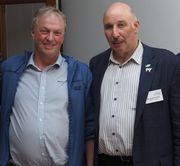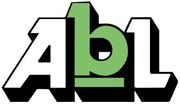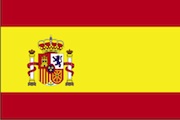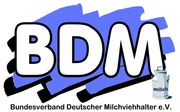EMB Newsletter April 2018
Newsletter as PDF
Contact
EMB - European Milk Board asbl
Rue de la Loi 155
B-1040 Bruxelles
Phone: +32 - 2808 - 1935
Fax: +32 - 2808 - 8265
Dear dairy farmers, dear interested parties,

EMB on the right track for the future
The annual Members' Assembly of the European Milk Board was held on 16-17 April 2018 in Brussels. The agenda included workshops and discussions on strategic issues as well as the usual procedural points. As part of the latter, a new Executive Committee was elected. Johannes Pfaller from BDM, Germany and Pat McCormack from the ICMSA, Ireland have been elected as new members to the Executive Committee. Erwin Schöpges is the new President, and Sieta van Keimpema continues as Vice-president. With the previous team around Roberto Cavaliere, Boris Gondouin and Kjartan Poulsen, the EMB remains well positioned.
In addition to John Comer from Ireland, I too stepped down from my post. Over the last six years, John has contributed significantly to the work of the EMB Executive Committee. Thanks to his openness, knowledge and most definitely his dry sense of humour, he was highly regarded by all his colleagues.
My humble self had the honour of being an Executive Committee member and representing the EMB as its President since the founding of the organisation in 2006. So, it is time and a good opportunity to look back and take stock.
In 2002 and 2003, before the EMB was founded, my fellow colleagues and I from Germany had our first conversations with farmers from neighbouring European countries. To our surprise, after just a couple of hours of talking to each other, we realised that dairy farmers in all European countries were essentially facing the same problems. Milk prices were too low to both cover production costs and make a decent living. At the same time, proposals from the European Commission were pointing the dairy market in the direction of further liberalisation. There was little reason to be hopeful. We came to a common conclusion: We must unite at European level in order to defend our interests ourselves. Waiting for the established farmers' unions was not an option. Their political links are too obvious and they are therefore incapable of presenting a transparent and representative case in favour of producers. The first milestone was November 2004, when dairy farmers from Germany, Netherlands, Denmark and Austria met for the first time in Hamburg. They made a common demand for a milk price of 40 cents per litre. This was followed by meetings in Amsterdam, Billund and Salzburg. The number of countries represented by the attending dairy farmers increased with every meeting, and thus Italy, Belgium, Switzerland and France also joined our ranks. Finally, in June 2006 in Montichari, Italy, we were able to found the EMB. An Executive Committee made up of seven active dairy farmers representing the member organisations began their work. We set up an office with Sonja Korspeter as the first managing director.
Since then, the EMB has grown to include 20 organisations from 15 countries. We are well-established at European level and enjoy the respect and recognition of MEPs and Commission representatives as a professional organisation. Armed with committed employees in the Brussels headquarters led by managing director Silvia Däberitz, key competences as well as a fighting spirit that is impossible to extinguish, the EMB is striving to bring about corrections in European agricultural policy. Triumphs like the establishment of the Milk Market Observatory and the implementation of volume reduction measures in 2016 motivate us to continue fighting. Since the creation of the EMB, the need to have a dedicated organisation consistently representing the interests of Europe's dairy farmers has not changed. Even the end goal of cost-covering milk prices and socially-viable milk production continues to be valid.
I would like to warmly thank all fellow campaigners in the Executive Committee and the member organisations for their confidence in me over the years. I congratulate the newly-elected Executive Committee under the leadership of Erwin Schöpges and Sieta van Keimpema and wish them every success. The European Milk Board is on the right track to improve conditions for dairy farmers.
Romuald Schaber, EMB President 2006-2018
European dairy farmers' organisation: after many years as President, Romuald Schaber passes the baton to Erwin Schöpges
Appeal for a change in the current agricultural and trade policy
AbL Milk Conference
Situation in Spain
B.M.G. insolvency: constructive emergency aid, but another raft of measures required
Interview with long-standing EMB President Romuald Schaber on bidding farewell to the EMB
Impressum
European Milk Board asbl
Rue de la Loi 155
B-1040 Bruxelles
Phone: +32 2808 1935
Fax: +32 2808 8265
E-Mail: office@europeanmilkboard.org
Website: http://www.europeanmilkboard.org






